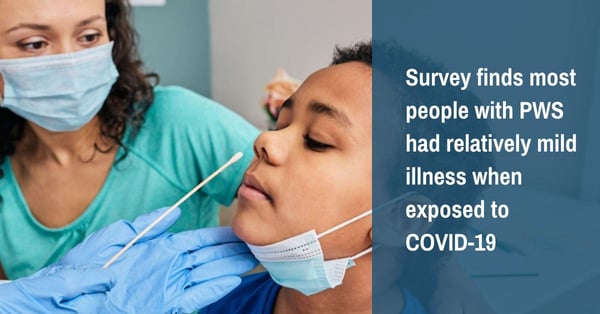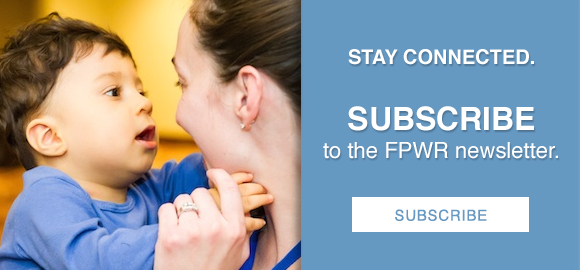COVID-19 infections may be particularly worrisome for our loved ones with PWS, since many of the complications associated with PWS—obesity, diabetes, poor respiratory function—are known risk factors for severe COVID disease. In addition, other neurodevelopmental disorders, such as Down syndrome, have been associated with a highly increased rate of severe disease compared to the general population. However, a survey completed in 2020-2021 — though limited — provides some reassurance in that most individuals with PWS experienced relatively mild illness when exposed to COVID-19.

The International Prader-Willi Syndrome Organisation (IPWSO) developed an online survey to be completed by individuals who cared for a person with PWS who got infected with COVID-19. The goals of the study included:
- Identifying the early symptoms of COVID-19 infection in people with PWS
- Examining the severity of the disease and how severity related to known risk factors
- Determining if the PWS diagnosis led to any barriers for treatment and care
- Developing recommendations about diagnosis and treatment of COVID-19 if there were PWS-specific concerns
The results are reported in the open-access publication: The Presentation, Course and Outcome of COVID-19 Infection in People With Prader-Willi Syndrome: Unexpected Findings From An International Survey.
The survey was open from April 2020 through April 2021 and was advertised on social media and through various PWS organizations. During that time, data was collected on 72 individuals (47 adults, 25 children) with PWS from 17 countries, who became ill with COVID-19. Approximately half of the participants were overweight or obese, and five had diabetes.
Approximately 30% of the individuals with COVID-19 tested positive but had no symptoms. For those individuals who did have symptoms, fever, fatigue, dry cough, headache and generally feeling "unwell" were most often reported, which is very similar to what is seen in the general population.
Somewhat surprisingly, in almost all cases reported in this survey, the illness was considered mild, with the illness most often lasting less than a week and managed in the home setting. Only a few people were hospitalized, but those hospitalizations were brief (longest stay was 4 days).
There were no significant associations between severity of disease and the age of the person with PWS, genetic subtype or body mass index (obesity). Most respondents indicated that the person with PWS needed no special medical care or had received the best available medical care for their symptoms, but two respondents expressed concern that others had been prioritized over their loved one with PWS.
The authors conclude that people with PWS seemed to do unexpectedly well overall when infected with COVID-19. The reasons for this aren’t clear, but the authors speculate that the innate immune system of those with PWS may provide relatively strong protection against viral infections.
Like any other survey-based study, there are some limitations, including that only data from caregivers who were aware of the survey and chose to fill it out were analyzed. It’s impossible to know how many individuals with PWS were infected with COVID-19, but this study captured only a small percent of the total cases. In addition, although the survey was available globally, language and access limited the possible responses.
Despite these limitations, the survey provides some reassurance in that most individuals with PWS experienced relatively mild illness when exposed to COVID-19.








